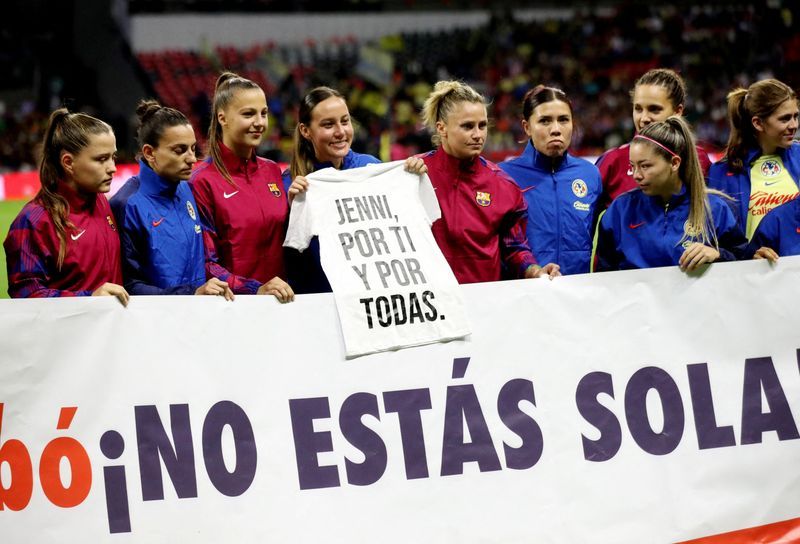MADRID (Reuters) – The kiss shared between the president of the Spanish football federation (RFEF), Luis Rubiales, and footballer Jenni Hermoso during the World Cup has sparked outrage and triggered a “Me Too” moment in Spain. This incident has shed light on long-standing allegations of predatory behavior by men in sports towards women. Veronica Boquete, former captain of the Spanish national team, stated that Rubiales’ kiss is just the tip of the iceberg of what women have experienced behind closed doors.
Spain has been grappling with the issue of gender-based abuse for years, and this scandal comes after high-profile cases such as the 2016 gang-rape of a teenager known as the “Wolf Pack” which led to reforms in sexual consent laws. The women’s football team in Spain has been fighting against sexism and striving for gender parity for almost a decade. Their efforts have included two dressing room rebellions that resulted in the end of several players’ international careers.
Veronica Boquete, along with other players, led a mutiny in 2015 calling for the resignation of coach Ignacio Quereda after a poor performance in the World Cup. In a documentary titled “Breaking the Silence,” players revealed a culture of bullying and condescension under Quereda’s leadership. However, Quereda denied the players’ allegations.
The RFEF has not responded to requests for comment regarding complaints of mistreatment made by players over the past ten years and the measures taken to address them. Although the federation has guidelines to prevent harassment and abuse among children and adolescents in its clubs, there are no specific guidelines addressing gender harassment or sexism.
After Quereda’s resignation in 2015, Jorge Vilda became the new coach. However, some old habits allegedly persisted under Vilda’s leadership, such as monitoring players by keeping hotel room doors open. Players accused Vilda of micromanaging and interfering with senior players’ statements during interviews. Vilda also removed several players who were at the forefront of seeking Quereda’s removal from the squad, including Veronica Boquete.
In September 2022, 15 members of the women’s national team went on strike demanding better working conditions, including a physiotherapist and business class travel. Although some demands were met, most of the players involved were excluded from the squad. Vilda, who is currently facing potential dismissal, has not responded to requests for comment.
Similar to the #MeToo movement, female sports journalists in Spain have also spoken out against sexist behavior. Reporter Berta Collado shared her experience of being objectified by Atletico Madrid president Enrique Cerezo during an interview. Sexism is prevalent at all levels of the sport, from grassroots to the national team, according to Carlota Planas, the founder of Unik Sports Management.
Regional leaders of the RFEF have promised structural changes, but many do not expect an immediate culture shift due to the predominance of men within the federation. However, the recent events have brought increased scrutiny on those in power and their behavior. The hope is that this exposure will lead to long-lasting change, although it may not happen overnight.
(Reporting by Fernando Kallas and Charlie Devereux; additional reporting by Emma Pinedo and Aislinn Laing; editing by Aislinn Laing and Andrew Cawthorne)
Credit: The Star : News Feed






